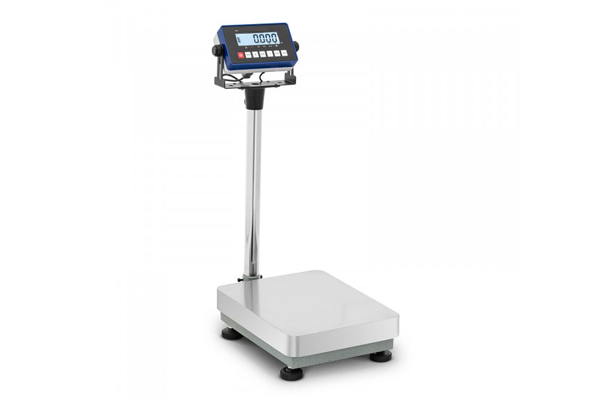In the world of weighing instruments, choosing the right type of scale is crucial for accuracy, efficiency, and suitability for specific tasks. Among the various options available, platform scales and bench scales are two of the most commonly used types in both industrial and laboratory settings. Although both serve the fundamental purpose of measuring weight, they differ significantly in terms of design, capacity, application, and operational features.
Understanding these differences is essential for selecting the appropriate scale to meet specific needs. Whether it involves handling large, bulky items in a warehouse or performing precise measurements in a laboratory, knowing the characteristics and advantages of platform scales and bench scales helps users make informed decisions. This article examines how the two types differ and provides guidance on choosing the right one for each application.

Platform scale overview
Definition
A platform scale is a weighing device designed to measure heavy and bulky items. It features a flat, sturdy platform where users place objects for weighing. Many platform scales offer portability, making them easy to move within industrial or commercial spaces.
Features
Platform scales stand out because of their large platform size and robust construction. Manufacturers build these scales to handle rough use in warehouses, factories, and shipping centers. Most models include a digital or analog display for clear weight readings.
Some platform scales support additional features like tare functions, overload protection, and connectivity to computers or printers. These features help users record and manage weight data efficiently.
Uses
People use platform scales in many industries. In warehouses, workers weigh crates, boxes, and pallets before shipping. Factories rely on platform scales to check the weight of raw materials or finished goods. Shipping companies use them to ensure packages meet transport requirements.
Common uses for platform scales:
- Weighing large containers
- Measuring heavy equipment
- Checking pallet weights before loading
Benefits
Platform scales provide several advantages. Their high weight capacity allows users to measure heavy loads accurately. The large platform accommodates oversized items that do not fit on smaller scales. Portability makes it possible to use the same scale in different locations.
Platform scales also improve efficiency in busy environments. Workers can quickly weigh items without moving them far. The sturdy design ensures long-lasting performance, even with frequent use.
Bench scale overview
Definition
A bench scale is a type of platform scale designed for smaller items. It offers lower weight capacity but higher accuracy compared to larger scales. Many industries use bench scales for precise weight measurement of small objects.
Features
Bench scales have a compact size and lightweight design. They fit easily on workbenches or countertops. Most models provide digital displays for clear readings and user-friendly controls.
These scales deliver accurate weight measurement for items like food portions, laboratory samples, or small packages. Some models include features such as tare functions, counting modes, and overload protection. Users can often connect bench scales to computers or printers for data tracking.
Uses
Bench scales serve many roles in different settings. Laboratories use them to weigh chemicals or samples. Retail stores rely on bench scales for pricing small packaged goods. Kitchens use these scales to portion ingredients for recipes.
Common uses for bench scales:
- Weighing food portions
- Measuring laboratory samples
- Checking product weights in retail
Benefits
Bench scales offer several advantages. Their small size saves space and makes them easy to move. High precision ensures reliable results for small items. The convenience of quick setup and easy cleaning adds to the advantages of bench scales.
Bench scales work best for tasks that require accurate weight measurement but do not involve heavy loads. Users should always match the platform size and capacity to their needs. This helps prevent errors and ensures safe operation.
Comparison
Design
Platform scales feature a large, flat surface and sturdy frame. Manufacturers often add wheels or handles to improve portability. Bench scales have a compact design and fit easily on tables or counters.
Capacity
Platform scales offer a high weight capacity. They can measure heavy loads such as pallets and crates. Bench scales provide a lower weight capacity, which suits small items like food portions or lab samples.
|
Scale Type |
Typical Weight Capacity |
Platform Size |
|---|---|---|
| Platform Scale | Up to several tons | Large |
| Bench Scale | Up to several kilograms | Small/Medium |
Workers choose platform scales for tasks that require measuring large objects. Bench scales work best for lighter items that need precise readings.
Accuracy
Bench scales deliver greater accuracy for small items. Their sensors detect slight changes in weight. Platform scales focus on handling heavy loads, so their accuracy is suitable for larger objects but less precise for small measurements.
Applications
Platform scales serve industries like shipping, warehousing, and manufacturing. Workers use them to weigh pallets, containers, and equipment. Bench scales appear in laboratories, kitchens, and retail stores.
- Platform scales: Weighing bulk goods, shipping crates, industrial materials
- Bench scales: Measuring ingredients, checking product weights, analyzing samples
Each scale type matches specific needs. Users select platform scales for heavy-duty jobs and bench scales for tasks that require accuracy and convenience.
Choose between platform scales and bench scales

Needs assessment
People should start by identifying what they need to weigh. Large items like pallets or crates require a scale with high capacity. Small objects such as food portions or lab samples need a scale with greater accuracy.
The environment also matters. Industrial spaces often need durable scales that can handle rough use. Retail stores or laboratories benefit from compact scales that fit on counters or benches.
Factors
Several factors influence the choice of scale. Weight capacity stands out as a key consideration. Platform scales handle heavier loads, while bench scales suit lighter objects.
Accuracy plays a major role for tasks that need precise measurements. Platform size affects both safety and convenience. Users should check if the scale fits the available space.
Maintenance requirements differ between scale types. Platform scales may need regular cleaning and calibration in busy environments. Bench scales often require less upkeep.
| Factor | Platform Scale | Bench Scale |
|---|---|---|
| Weight Capacity | High | Low |
| Accuracy | Moderate | High |
| Size | Large | Small/Medium |
| Maintenance | Moderate/High | Low/Moderate |
Cost
Cost varies based on scale type and features. Platform scales usually cost more because they offer higher capacity and durability. Bench scales tend to be more affordable, especially for basic models.
Advanced features like data connectivity or counting modes can increase the price. Maintenance costs also add up over time, especially for scales used in harsh environments.
- Platform scales measure heavy, large items. Bench scales provide accuracy for small objects.
- Each scale type fits different environments and tasks. Users should match their choice to their needs.
Conclusion
In summary, both platform scales and bench scales serve important but distinct purposes in weighing applications. Platform scales are designed for heavy-duty use, offering large capacities and durable construction ideal for industrial and warehouse environments. Bench scales, on the other hand, prioritize precision and compactness, making them better suited for laboratories, production lines, and retail settings. Understanding the unique strengths of each type enables users to select the most efficient and cost-effective solution for their specific operational needs.
